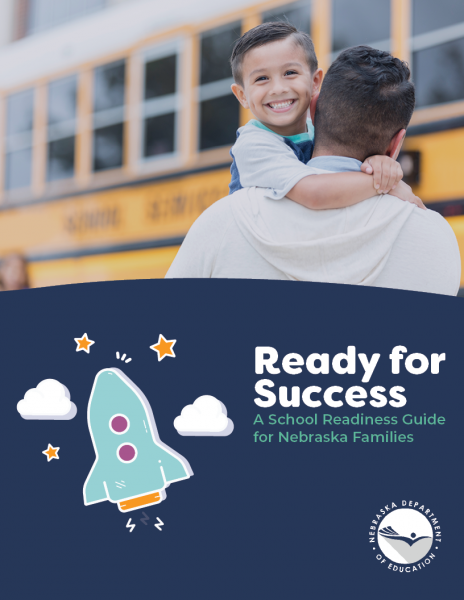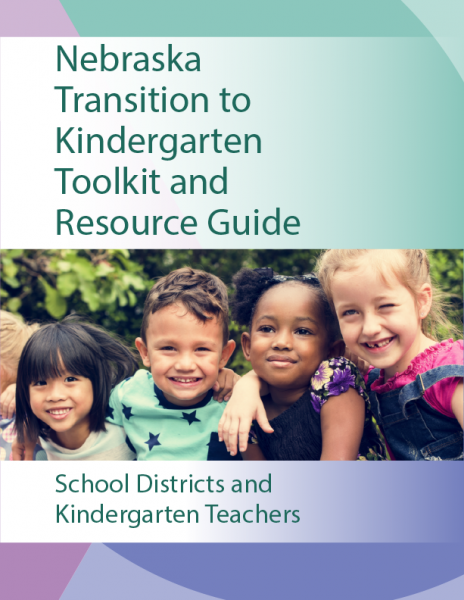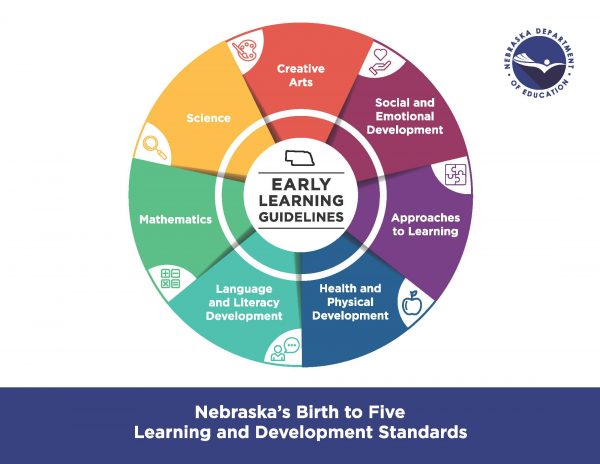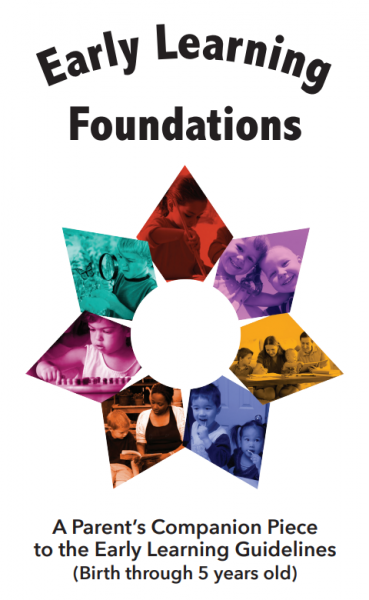School Readiness
Getting Ready for Kindergarten
The Nebraska Department of Education recognizes that it is important for children in kindergarten programs to have expectations appropriate for their physical, emotional, and intellectual capabilities.
The goal of kindergarten is to make the best match between teaching and learning for every child to support a successful school experience. Use the information provided on the tabs below to support in the transition into kindergarten.

Children are born with the innate ability to learn. Good health and experiences that help build knowledge, social and physical skills set the stage for success.
Beneficial skills include:
- curiosity and enthusiasm for learning
- social skills and self regulation
- respectful of authority figures
- curiosity and enthusiasm for new activities/skills
- confidence, cooperation & ability to practice self-control
While these skills are a good predictor of school readiness, it is the school’s responsibility to be ready for the child, as kindergarten is an inclusive place for children of all abilities.
The only requirement for children to begin kindergarten is that they reach the age of five years old on or before July 31. Therefore, it is not a question of whether the age-eligible child is ready for kindergarten. Rather, it is a question of how the child can be supported with the transition to school to ensure that the school is ready for the child.
- Nebraska law entitles children to receive free public education the year that they turn five on or before July 31.
- It is the responsibility of schools to be ready to meet the individual needs of every age-eligible child, regardless of their abilities. Therefore, schools cannot test age-eligible children for kindergarten entrance, nor suggest delaying entrance.
- School districts are allowed to enroll a child who misses the cutoff date, but turns five between August 1 and October 15. Parents who are interested in early entrance enrollment, should contact their school as soon as possible to ask about their procedure for early entry assessment.
- Nebraska teachers utilize curriculum that supports current state standards, which are indicators to what children should know and be able to do by the end of the school year. The Nebraska state standards address: language arts (reading, writing, and communicating), mathematics, science, and social studies.
- Kindergarten programs have evolved to be more structured and academic. This may raise some concern for parents about their child’s ability.
- Public preschool is typically no longer an option once a child is eligible for kindergarten.
- State law requires that children begin school the year they turn six (known as “compulsory age”).
Children enter kindergarten with a wide variety of skills and knowledge. There are many contributing factors to school readiness. It is important for early childhood practitioners to understand these predictors of success.
Kindergarten teachers have relayed that children who display success exhibit the following characteristics:
- healthy & rested
- able to pay attention, follow directions
- able to communicate their thoughts and needs without being disruptive
- able to recognize personal space around others
When considering the abilities linked to success for kindergarten, the practice called “red-shirting,” (waiting another year after eligible entrance) is often brought up by parents. As an early childhood practitioner, you are a resource to help them understand their options: and an unbiased supporter of their decision.
- Research shows that when red-shirted children start school, they may have more knowledge and skills than their peers, but by the end of kindergarten, and certainly by third grade, most children catch up with one another.
- When children are red-shirted, some may regress, acting out because they are bored and their developmental needs aren’t being met.
- Consider what options are available in your community if the child will not be in kindergarten that will help the child be ready for kindergarten at a later date.
Families, communities, and schools work together to prepare children for school and to ensure that the school is ready to meet children’s individual needs. Parents and providers can work on the following areas.
Promote Good Health & Physical Skills by providing:
- a balanced diet and plenty of rest
- regular dental and medical care, including immunizations
- active play outdoors
- large muscle activities: climbing, dancing, running, balancing
- small muscle activities: coloring, painting, drawing, cutting
Encourage Positive Attitude & Desirable Social Skills by providing experiences for:
- learning confidence: making choices, trying new things and hearing praise for efforts
- working alone and with others to finish tasks, including putting away supplies
- taking care of own things and needs: dressing self, using the toilet, and washing hands
- learning to problem-solving, sharing and cooperating by playing with others
- paying attention and following simple 3-step directions
- communicating needs, wants, thoughts, and feelings, while not disrupting others
- expressing emotions in safe ways and learning to control reactions and behaviors
Support Knowledge & Thinking Skills by providing time for:
- being read to every day and listening to stories in a group
- talking about letters, the sounds they make and environmental print
- asking and answering questions, and exploring topics of interest together
- counting, sorting and classifying things, noticing likenesses and differences, such as more and smaller
- practicing drawing, writing, and recognizing numbers, shapes, colors, and letters in their name
- observing about the world by seeing and touching objects; hearing new sounds, smelling and tasting foods; and watching and making things move
- learning through play: children learn best when given the opportunity to explore their environment and take risks through hands-on engagement, rather than flashcards and worksheets
An optimistic entry into kindergarten will nurture a positive attitude about school and learning. Parents, providers, and schools must work together to:
- Talk enthusiastically about school, read books about starting kindergarten, and discuss feelings the children may have.
- Learn about school and classroom expectations, including routines, and rules that the children should display.
- Arrange to visit the new classroom.
- Engage in a joint conference between the family and teachers (both early childhood and kindergarten) to discuss any needs or concerns and share ways for the child to be successful.
- Families are encouraged to talk to the teacher or principal if they are concerned.
- Utilize the resource: Ready for Success
- Play in the Early Years: Key to School Success, and Play: It’s the Way Young Children Learn
- Ages and Stages
- Link to Families As Primary Partners in their child’s Development & School Readiness
- The Nebraska Early Learning Guidelines (Birth-5 years)
- Kindergarten Content Area Standards
- Ready for School, Ready for Life. 1 in 8 Kids Isn’t Ready. Is Yours? (Video)
- Texts for Teachers
- Student-Friendly Language Arts Standards (K-12)
Redshirting
- Redshirting: Holding kids back from kindergarten 60 Minutes Special (video)
- When Should Kids Start Kindergarten
- Pros and Cons of Academic Redshirting
- Is Your Child Ready for Kindergarten?
Reading & Literacy
- 10 Things You Can Do To Raise A Reader
- Is My Child Ready for Kindergarten?
- Fostering A Love For Reading in Children
- Teaching Literacy Skills and a Love of Reading
- Reading tips
- Center for Early Literacy Learning- Providers Resources
- Educational Games, Videos, and Activities
Social Skills
- Pyramid Model for Early Childhood Education
- Pyramid Resources for Families
- How Parents Can Support Social Communication Development
- Growing Ideas Tip Sheets and Resources for Guiding Early Childhood Practices-Social Emotional Development
- Friends and Feelings
- Social Development
- Behavior Communicates
- Developing Self-Regulation
- Rocking and Rolling –It Takes Two: The Role of Co-Regulation in Building Self-Regulation Skills
- Executive Function: Skills for Life and Learning (video)
- Improved Behavior, Improved Learning
Transition to Kindergarten
- Accommodating Anxieties and Fears
- Experts weigh in: “How can I get my young child less anxious about starting school?”
- Effective Transition Practices & Strategies
- Transitioning to Kindergarten Toolkit
- Kindergarten Advice From Kindergartners (video)
- What Child and Parents can expect and how to prepare for kindergarten (video)
- Kindergarten Readiness
- Easing the Transition to Kindergarten
- Transition Plan Template & Activity Ideas
- Starting School Advice
For Parents
School Readiness Publications

Ready for Success Booklet
A School Readiness Guide for Nebraska Families

Nebraska Transition to Kindergarten Toolkit and Resource Guide
The Nebraska Transition to Kindergarten Toolkit and Resource Guide is for families, school district leadership and kindergarten teachers, and early childhood care and education (ECCE) providers and administrators. This toolkit presents a common understanding of developmentally appropriate expectations and practices that support continuity in transitions for young children. Research-based activities, strategies, and resources specific to families, schools, and ECCE providers are outlined to support transition into kindergarten for young children.

Early Learning Guidelines
Nebraska’s Birth to Five Learning and Development Standards

Early Learning Foundations
A Parent Companion to Early Learning Guidelines






